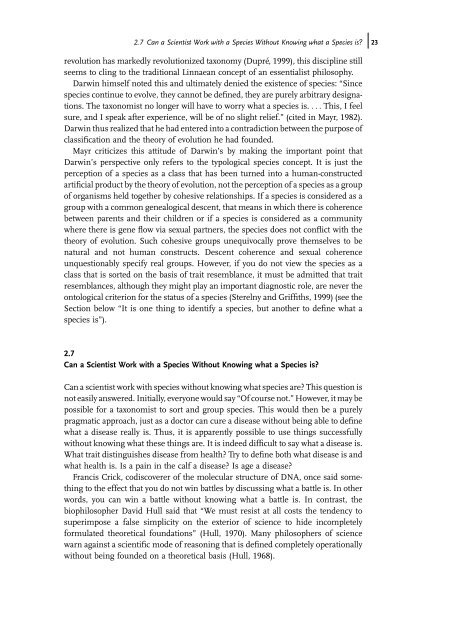Principios de Taxonomia
Create successful ePaper yourself
Turn your PDF publications into a flip-book with our unique Google optimized e-Paper software.
2.7 Can a Scientist Work with a Species Without Knowing what a Species is?j23<br />
revolution has markedly revolutionized taxonomy (Dupre, 1999), this discipline still<br />
seems to cling to the traditional Linnaean concept of an essentialist philosophy.<br />
Darwin himself noted this and ultimately <strong>de</strong>nied the existence of species: Since<br />
species continue to evolve, they cannot be <strong>de</strong>fined, they are purely arbitrary <strong>de</strong>signations.<br />
The taxonomist no longer will have to worry what a species is. ...This, I feel<br />
sure, and I speak after experience, will be of no slight relief. (cited in Mayr, 1982).<br />
Darwin thus realized that he had entered into a contradiction between the purpose of<br />
classification and the theory of evolution he had foun<strong>de</strong>d.<br />
Mayr criticizes this attitu<strong>de</strong> of Darwin s by making the important point that<br />
Darwin s perspective only refers to the typological species concept. It is just the<br />
perception of a species as a class that has been turned into a human-constructed<br />
artificial product by the theory of evolution, not the perception of a species as a group<br />
of organisms held together by cohesive relationships. If a species is consi<strong>de</strong>red as a<br />
group with a common genealogical <strong>de</strong>scent, that means in which there is coherence<br />
between parents and their children or if a species is consi<strong>de</strong>red as a community<br />
where there is gene flow via sexual partners, the species does not conflict with the<br />
theory of evolution. Such cohesive groups unequivocally prove themselves to be<br />
natural and not human constructs. Descent coherence and sexual coherence<br />
unquestionably specify real groups. However, if you do not view the species as a<br />
class that is sorted on the basis of trait resemblance, it must be admitted that trait<br />
resemblances, although they might play an important diagnostic role, are never the<br />
ontological criterion for the status of a species (Sterelny and Griffiths, 1999) (see the<br />
Section below It is one thing to i<strong>de</strong>ntify a species, but another to <strong>de</strong>fine what a<br />
species is ).<br />
2.7<br />
Can a Scientist Work with a Species Without Knowing what a Species is?<br />
Can a scientist work with species without knowing what species are? This question is<br />
not easily answered. Initially, everyone would say Of course not. However, it may be<br />
possible for a taxonomist to sort and group species. This would then be a purely<br />
pragmatic approach, just as a doctor can cure a disease without being able to <strong>de</strong>fine<br />
what a disease really is. Thus, it is apparently possible to use things successfully<br />
without knowing what these things are. It is in<strong>de</strong>ed difficult to say what a disease is.<br />
What trait distinguishes disease from health? Try to <strong>de</strong>fine both what disease is and<br />
what health is. Is a pain in the calf a disease? Is age a disease?<br />
Francis Crick, codiscoverer of the molecular structure of DNA, once said something<br />
to the effect that you do not win battles by discussing what a battle is. In other<br />
words, you can win a battle without knowing what a battle is. In contrast, the<br />
biophilosopher David Hull said that We must resist at all costs the ten<strong>de</strong>ncy to<br />
superimpose a false simplicity on the exterior of science to hi<strong>de</strong> incompletely<br />
formulated theoretical foundations (Hull, 1970). Many philosophers of science<br />
warn against a scientific mo<strong>de</strong> of reasoning that is <strong>de</strong>fined completely operationally<br />
without being foun<strong>de</strong>d on a theoretical basis (Hull, 1968).



